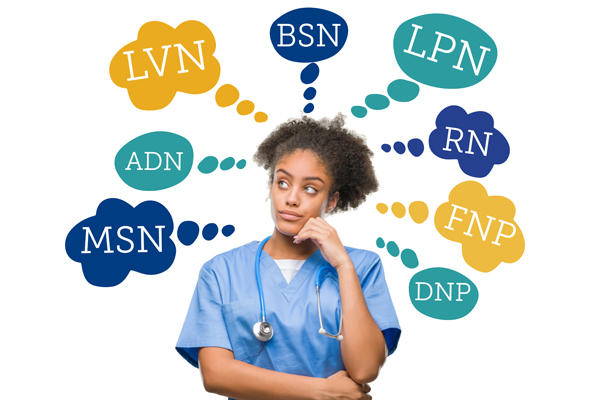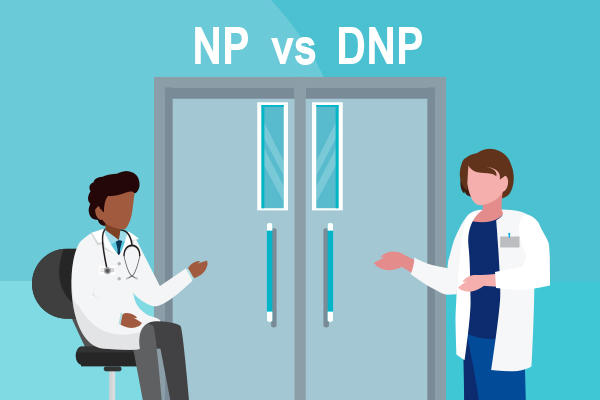Featured
Tags
Share
- Home / Blog / Nursing Today / Nursing Abbreviations and Acronyms Explained
Nursing Abbreviations and Acronyms Explained

Nursing Credential Abbreviations
Nursing is a profession that is awash with abbreviations. LPN, LVN, RN, ADN, BSN, MSN, FNP, DNP, PhD.... all the letters that follow a nurse’s name can make you feel like you are staring into a bowl of alphabet soup. Confused? No worries, here’s a guide to provide you with ways to decipher nursing abbreviations.
Funnily enough, despite there being an overwhelming amount of nursing credentials and nursing acronyms that can appear after a nurse’s name, there are only three types of nurse titles:
- Practical or Vocational Nurse (LPN or LVN): These nurses are responsible for basic care and comfort of their patient.
- Registered Nurse (RN): Registered nurses are responsible for completing medical treatments as ordered, along with being involved in the diagnostic process.
- Advanced Practice Registered Nurse (APRN): These nurses have advanced degrees that allow them to assess, diagnose and treat medical conditions. They also can order and interpret diagnostic tests and, in some cases, they must be supervised by a physician.
After that, nursing abbreviations fall into four different categories that help define what a nurse’s role is in a clinical, research or teaching setting: educational letters, license letters, certification letters and achievement letters.
Educational Letters Nursing Abbreviations
Important nursing credentials that you can display are your educational letters. Whether you’ve received a PNC, ADN, BSN, MSN, DNP, Ph.D. or any other version of a degree, you worked hard for those letters and should display them with pride. Here is a list of educational letter nursing abbreviations:
A Practical Nursing Certificate (PNC) is earned after a yearlong study of nursing and applied science that permit the holder to work in an entry level practical nursing job. They typically work as nurses' aides, home healthcare and hospice nurses. They perform very basic nursing tasks and are more focused on the patient’s comfort.
Associate’s Degree are two-year programs that prepare a student to sit for the NCLEX® Exam to become an LPN/LVN or an RN. There are several versions you might see:
- Associate Degree in Applied Science (AAS)
- Associate Degree in Nursing (ADN)
- Associate of Science Degree in Nursing (ASN)
- A Bachelor of Science in Nursing (BSN) is an undergraduate degree. It can be earned through an entry-level bachelor’s program that typically takes three to four years to complete and prepares you to sit for the NCLEX® Exam. For nurses who already hold a diploma in nursing or ADN, it can also be earned through a RN to BSN Online Option. There are a number of important reasons to consider earning your BSN, including recommendations from the Institute of Medicine.
- A Master of Science of Nursing (MSN) is a graduate degree that can take as few as two years to complete. This degree allows you to specialize, diving deeper into a practice area and preparing you to sit for exams to earn nursing credentials post-graduation including as a Family Nurse Practitioner (FNP), an Adult-Gerontology Nurse Practitioner (AGNP) and a Nurse Educator (MSN-NE), as a few examples.
- A Doctor of Nursing Practice (DNP) or a Doctor of Philosophy in Nursing (Ph.D.) are the highest degrees you can earn in nursing. Nurses pursuing this path may want to teach at the highest level, pursue research or strive for high-level administrative roles in healthcare or educational settings.
Licensure Nursing Abbreviations
The nurse titles that deal with licensure are very important because it sets the minimum qualifications and competencies that a nurse holds, therefore assuring the public that the predetermined skills and knowledge for each license have been met.
The most common and recognizable nurse licensure is the RN abbreviation. However, there are many nursing credentials licenses beyond the RN license.
So, what does RN stand for, anyhow?
An RN is a registered nurse, who has been trained to practice the core competencies of nursing, ensuring a patient receives high quality and effective care.
That is a really long and complicated way of saying that you have earned a diploma in nursing, an associate’s or bachelor’s degree and that you have sat for and passed the board exams that provide you with your license.
Licenses that precede the RN in scope of practice are Licensed Practical Nurse (LPN) and Licensed Vocational Nurse (LVN). These are both the same license, distinguished by the state where the nurse that received the license (California, Texas and Vermont use LVN, the rest of the United States use LPN.) The skills that a nurse with an LPN or LVN perform are basic healthcare tasks –such as changing bandages, administering approved medications, monitoring a patient’s vital signs and helping patients bathe and dress.
Licenses that come after the RN are all conferred on nurses with graduate level degrees. Some of these include ARNP (Advanced Registered Nurse Practitioner,) CRNP (Certified Registered Nurse Practitioner,) CNP (Certified Nurse Practitioner,) LNP (Licensed Nurse Practitioner) and NPC (Nurse Practitioner Certified.) All these licenses require different board exams and levels of education.
According to Nursing World, “APRNs treat and diagnose illnesses, advise the public on health issues, manage chronic disease, and engage in continuous education to remain ahead of any technological, methodological, or other developments in the field. APRNs hold at least a Master’s degree, in addition to the initial nursing education and licensing required for all Registered Nurses (RNs).”
Some of APRN licenses require that the nurse be supervised by a physician while performing practice and skills.
Certification Letters
The Difference Between Certification Letters and Academic Certificates
It’s easy to confuse an academic certificate with certification letters. Here is an easy way to remember the difference:
Academic certificates are awarded by an institution of learning and are used to demonstrate academic knowledge in a specific are of study. Chamberlain has seven graduate certificate programs, for instance.
Certification letters apply to specialties or sub-specialties that nurses have to apply and test to receive. Usually, a nurse has to complete a set number of hours in care for the patient population they are seeking certification for before they can apply and test. For example, to receive a CCRN (Critical Care Nurse) certification, a nurse must work 1,750 hours in direct care of acutely/critically ill patients before they can apply to be certified.
Here are some of the most common certifications nurses receive:
| Abbreviation | Specialty |
| AGANCNP-BC | Adult Gerontology –Acute Care |
| AGCPNC-BC | Adult Gerontology –Primary Care |
| APRN | Advanced Practice Registered Nurse |
| ARNP | Advanced Registered Nurse Practitioner |
CCRN | Critical Care Nurse |
| CPNP-AC | Pediatric Acute Care Nurse Practitioner |
FNP | Family Nurse Practitioner |
| NNP-BC | Neonatal Nurse Practitioner |
NPC | Nurse Practitioner Certified |
PMHNP-BC | Psychiatric-Mental Health Nurse Practitioner |
| PPCNP-BC | Pediatric Primary Care Nurse Practitioner |
| WHNP-BC | Women’s Health Nurse Practitioner |
Achievement Letters
These abbreviations mean that the nurse has been recognized as exceptional by an organization or foundation. The most common are FANN (Fellow of the American Academy of Nurses) and FAANP (Fellow of the American Academy of Nurse Practitioners.) These letters also can indicate awards the nurse has won, such as The DAISY Award® or the eight distinction awards that The American Nursing Association (ANA) awards to exceptional nurses.
One Last Nursing Acronym
If this still seems like alphabet soup to you, don’t fear. All you need to do to keep all these letters straight is remember that they are ELCA - Educational, Licensure, Certifications and Awards. Now that you’ve got the abbreviations straight, learn how to list them in our post “RN BSN or BSN RN: How to Display Your Nursing Credentials.”
By Kate Rice
More from Nursing Today
Request More Information
To receive the Chamberlain University Program Guide, including associated career paths, please select a program of study.







